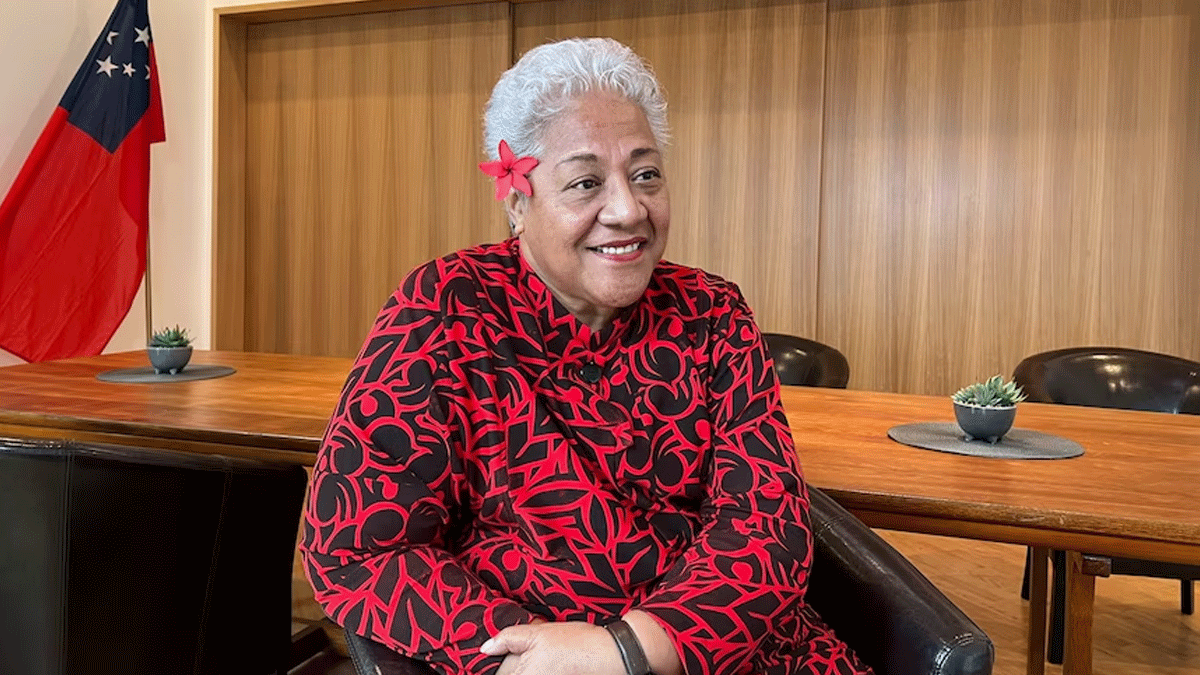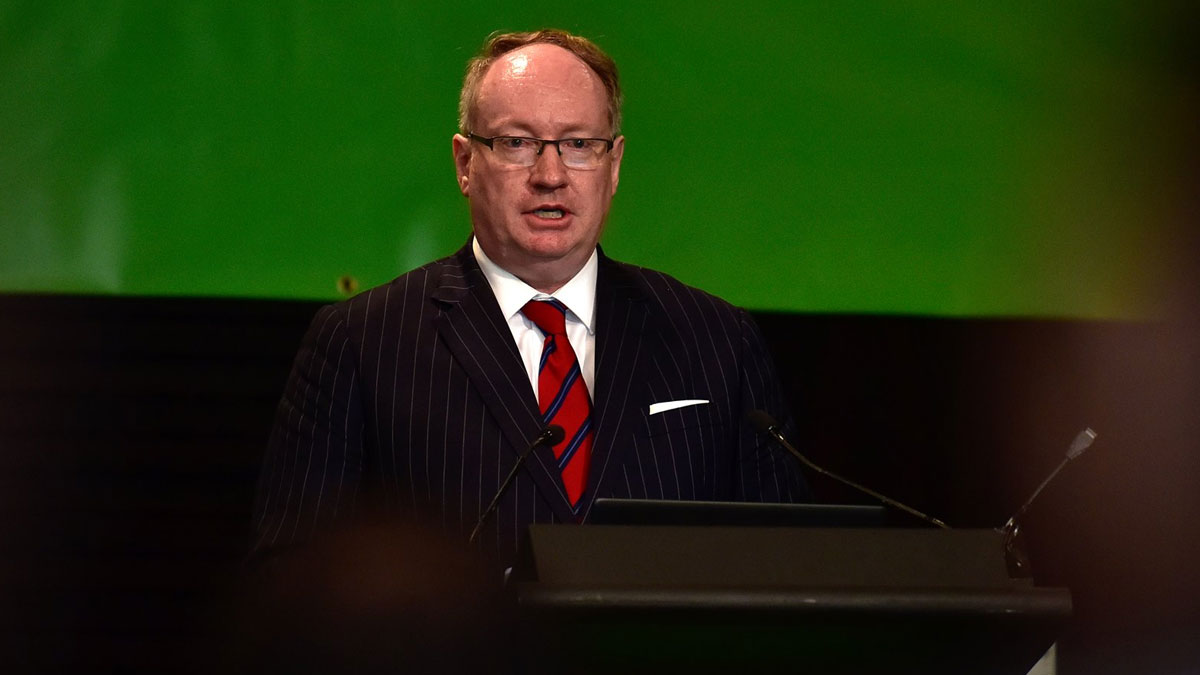
Samoa's Prime Minister Fiame Naomi Mata'afa has again raised deep concerns about the exodus of Pacific workers to Australia and New Zealand, arguing that countries like hers should not been seen merely as "outposts" which "grow" labourers for developed nations.
The number of Pacific Island nationals heading to Australia under the Pacific Australia Labour Mobility (PALM) scheme has grown rapidly since COVID travel restrictions were eased, with the program now drawing in more than 35,000 workers on both short and longer term contracts.
The federal government has hailed the scheme as a major success, saying it has helped to fill workforce shortages in Australia while allowing Pacific Islanders to develop their skills and send valuable remittances back home.
But some Pacific nations — including Vanuatu, Tonga and Samoa – have become increasingly anxious that their own workforces are being depleted by the program, and are reviewing their rules allowing workers to travel to Australia.
Prime Minister Fiame acknowledged labour schemes had been an invaluable source of income for Samoa during the pandemic, but said more problems had cropped up as they "broadened" beyond unskilled farm work to take in professions like aged care and hospitality.
"When we're feeling the impact of losing our human resources through these various labour schemes, we really do have to look at how we respond," she told the ABC's The Pacific program.
"Where do we fill in those gaps?"
The prime minister also said she worried about the program's underlying dynamics, arguing that Pacific nations risked being seen as "just these outposts where we grow people".
"You know, either to send them off as sportspeople, or to send them off as labour mobility teams and so forth, as though that's our lot in life," she said.
"I really don't like that."
Earlier this year Prime Minister Fiame floated the idea of creating a European Union-style common market in the region, allowing the free movement of goods and people across Australia, New Zealand and Pacific Island nations.
She told the ABC that Pacific leaders needed to "sit down" with Australian and New Zealand officials to discuss labour shortages, and that both Canberra and Wellington should consider more "flexible and mobile" arrangements with Pacific neighbours to help relieve the pressure.
"I think the pressure for people to migrate, is because it's so hard to … just to go visit. A lot of Pacific Islanders think that [the] only way they can get access, in any significant way, to New Zealand and Australia, is through permanent migration," she said.
"But I think if we had more open access, and travel, there wouldn't be that pressure."
Australia has shown little appetite for that proposal so far, but the Department of Foreign Affairs and Trade told the ABC it would "continue to listen and respond to Pacific island priorities, including on labour mobility".
"The Australian Government is working closely with participating countries and stakeholders in the Pacific Australia Labour Mobility (PALM) scheme to ensure the scheme delivers a genuine skills dividend for our region and meets the wishes of each country," it said in a statement.
"Participating countries decide how many and which types of workers from their country take part in PALM, including who can register in work-ready pools, so they can retain the skills they need in their domestic workforce."
Complex issues facing Pacific workers
The director of the Development Policy Centre at the Australian National University, Stephen Howes, said while some Pacific employers had blamed labour schemes for skill shortages, it was difficult to gauge the scale of the problem.
"We haven't seen any industries collapse, so the evidence [of skills shortages] on the ground is limited," he told the ABC.
Professor Howes also said Pacific countries like Samoa were unlikely to stop sending workers to Australia because labour schemes remained such a crucial revenue stream for many families.
"Although we have seen a number of reviews by governments [in the Pacific], we haven't seen any governments actually pull back from these schemes," he said.
"That's because these schemes are so popular with workers, and so beneficial.
"And all these countries are democracies, so it would be very difficult and probably foolish for these governments to actually pull back from the scheme."
Professor Howes said the federal government's move to expand pay rates, entitlements and training opportunities for PALM workers would also help bolster the program.
But the complex knot of issues thrown up by the growing streams of workers to Australia will still likely be discussed when Pacific Island leaders gather in Cook Islands in November this year.
Fiame said she'd struggled to gain any "traction" for her proposal to liberalise movement in the region — in part because of intense strategic competition in the Pacific and internal divisions within the Pacific Islands Forum.
In March she claimed that Foreign Minister Penny Wong remained silent when she last raised the idea, while New Zealand's Deputy Prime Minister Carmel Sepuloni suggested it would draw an influx of Pacific Islanders.
But Professor Howes said the federal government's plan to introduce a Pacific Engagement Visa — which will provide Pacific Island citizens with 3,000 permanent resident visas every year — showed Australia was already starting to move beyond the temporary labour "paradigm".
"It's not going to happen overnight but … [we] are seeing movement in that direction," he said.
"With the Pacific Engagement Visa which Australia has now proposed — that's not a temporary migration scheme, that's allowing for permanent movement.
"The Pacific Engagement Visa is not visa free access, but it's a significant step in that direction."
In its statement, DFAT said that people from Pacific island countries and Timor-Leste would "have greater access to Australia and freedom of movement between Australia and participating countries when the Pacific Engagement Visa program commences".
The Coalition has supported the visa but opposed the lottery system proposed by the government to select people to come to Australia.
However, the government remains confident it will be able to secure support from the crossbench to get the visa – along with the lottery system – through the Senate.
By foreign affairs reporter Stephen Dziedzic, Dubravka Voloder and Johnson Raela
Original article link: https://www.abc.net.au/news/2023-08-31/fiame-samoa-pacific-labour-scheme-australia/102794256
Stay tuned for the latest news on our radio stations


